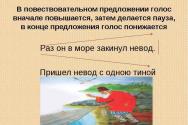The one who loves must share the fate of the one he loves. Unsurpassed quotes from the novel “The Master and Margarita”
The leitmotif of Margarita's mercy, mercy dictated by great love, runs through Bulgakov's entire novel The Master and Margarita. Her feeling is all-consuming and limitless. Therefore, the phrase in the title of my work accurately characterizes the history of the relationship between the Master and Margarita. I believe that only love that does not require anything in return can be called real. This applies to all love (and not just the relationship between a man and a woman): the love of children for their parents (and vice versa), love for friends and, in general, love for one’s neighbor. After all, this is exactly the kind of selfless love that Jesus Christ preached. The good deeds that we do, driven by love, benefit our neighbors, and sometimes the good we do comes back to us a hundredfold. But still, when doing good, one cannot be guided by selfish goals, because love does not imply the concept of “should” or the conclusion “if I help him, then at the right moment he will be obliged to help me.” All good deeds are performed only at the call of the heart.
So Margarita always acted, listening to the dictates of her own heart, and all her motives were sincere. For her, the Master contains the whole world, and the romance of her beloved contains the purpose of her life. Margarita is determined to do anything for the Master, and love inspires her to this determination. It is she who does wonderful things: Margarita is ready to go with the Master to last way, and in this act her self-sacrifice is most clearly demonstrated. She is ready to share the Master’s fate, she is even ready to make a deal with the devil to save her loved one. In addition, even after becoming a witch, she does not lose her good intentions. Margarita's love never required giving, she was a giver, not a taker. This is the essence of true love. It can't be any other way. And may God grant that those who deserve it experience such a real feeling. Every person has passions in their life. First, a spark ignites, and then it seems that it has happened - this is exactly the long-awaited high feeling. Sometimes the feeling of falling in love lasts a long time, sometimes the illusions are shattered almost immediately. But true love, no matter how pompous it may sound, happens once every 100 years. This is the kind of love Bulgakov describes. This kind of love is described by Kuprin in the story “ Garnet bracelet" The only difference between the love stories depicted in these works is that in the novel “The Master and Margarita” this feeling is mutual.
I also believe that the phrase “Whoever loves must share the fate of the one he loves” is consonant with Saint-Exupery’s expression “We are responsible for those we have tamed.” We must be responsible for our feelings and, therefore, always share the fate of the people we love.
I’ll say right away that this review will not contain an in-depth analysis of the novel and facts about it from Wikipedia. I'll just describe my emotions after reading it.
Hello, dear readers!
I am glad that I first read this work at the age of 20. It’s not that I didn’t like the novel “The Master and Margarita” as a teenager, but I probably wouldn’t have understood a lot of things. And the moments with Pontius Pilate would seem boring to me. But what I am 100% sure of is that from love line and the antics of the retinue I would be completely delighted.
In general, 2 years ago I read exclusively delusional dystopias, which were not particularly different from each other, but sometimes moments of enlightenment still came. Today I want to read the most serious literature and classics, which made me sick at 14-15 years old.
Unfortunately, I didn’t find a proper summary of the plot, so I’ll try to describe everything myself without spoilers. The action of the novel begins in Moscow on the Patriarch's Ponds, where a foreigner in his forties intervenes in a curious conversation between the editor of the art magazine Mikhail Aleksandrovich Berlioz and the young poet Ivan Bezdomny. None of them can even imagine where this conversation will lead. At the same time, Mikhail Afanasyevich introduces us to the procurator of Judea, Pontius Pilate, who is holding trial over a man who was accused of calling for the destruction of the temple. The most interesting thing is that these two events come together at some point. And in general, Bulgakov skillfully welds all the actions of the work into one whole.

There is another world in the novel, so to speak. A mystical world in which there are talking cats, vampires and zombies. I read the moments with them with special rapture, because I adore this focus with every fiber of my soul. The description of magic and rituals in the work “Master Margarita” is presented incredibly attractive and interesting. It seems to me that these moments will capture everyone and will not let go even after reading. For example, I still remember some chapters with details and quote catchphrases from the novel.

It is remarkable how Bulgakov wedges the magical world into the modern one. It is in this symbiosis that he shows the whole essence of society in the work. There will be a lot of vices here, there is something to think about. Just before the epigraph I sat for two minutes...

It's rare that the first chapter grabs my attention right away, but that's not the case. From the very first sentences, the novel captivates you and you cannot put it down. It was as if I was twisting a ball, turn by turn. True, at first some details were unclear, but by the middle everything fell into place. The twists in the plot were surprising, since it is almost impossible to predict something. This is what I like about this work.

I fell especially in love with two characters. The first is the cat Behemoth. Suddenly? Well, of course not! Absolutely everyone loves this terribly humorous and charming character, and I am no exception. I don't understand how you can not love him. And their pranks with Bassoon will definitely cause you a reaction similar to laughter or at least a grin.

My second favorite character in the novel is Ivan Nikolaevich Ponyrev, a poet under the pseudonym Bezdomny. I felt so sorry for him and was very upset that no one wanted to believe him or hear him. Well, whoever, but he was the most adequate and sensible in the entire work. I'm glad that the epilogue ends with words about this character.
Guys, we put our soul into the site. Thank you for that
that you are discovering this beauty. Thanks for the inspiration and goosebumps.
Join us on Facebook And In contact with
When Mikhail Afanasyevich Bulgakov wrote a novel about the Master, he hardly imagined that he was creating the most significant work Russian literature of the twentieth century. Today the work is deservedly included in the lists of the most books read world, while remaining the object of endless debate among literary scholars and philosophers.
And for website“The Master and Margarita” is simply a favorite story, full of mysteries and endless wisdom. What is needed most in our difficult times.
- Who told you that there is no real, true, eternal love? May the liar's vile tongue be cut out!
- We are talking to you in different languages, as always, but the things we talk about don’t change.
- Evil lurks in men who avoid wine, games, the company of lovely women, and table conversation. Such people are either seriously ill or secretly hate those around them.
- There are no evil people in the world, there are only unhappy people.
- These women are difficult people!
- A person without a surprise inside, in his box, is uninteresting.
- Everything will be right, the world is built on this.
- Yes, man is mortal, but that would not be so bad. The bad thing is that he is sometimes suddenly mortal, that's the trick!
- It's nice to hear that you treat your cat so politely. For some reason, cats are usually called “you,” although not a single cat has ever drunk brotherhood with anyone.
- An unhappy person is cruel and callous. And all just because good people mutilated him.
- Do you judge by the suit? Never do this. You can make a mistake, and a very big one at that.
- Never ask for anything! Never and nothing, and especially among those who are stronger than you. They will offer and give everything themselves.
- He who loves must share the fate of the one he loves.
- For mercy... Would I allow myself to pour vodka for the lady? This is pure alcohol!
- The second freshness is nonsense! There is only one freshness - the first, and it is also the last. And if the sturgeon is second freshness, then this means that it is rotten!
- It is easy and pleasant to speak the truth.
- Why pursue in the footsteps of what is already over?
- - Dostoevsky died.
- I protest, Dostoevsky is immortal! - And fact is the most stubborn thing in the world.
- All theories are worth one another. Among them there is one according to which everyone will be given according to their faith. May it come true!
- What country's wine do you prefer at this time of day?
- My drama is that I live with someone I don’t love, but I consider it unworthy to ruin his life.
- - Cowardice is one of the most terrible human vices.
- No, I dare to object to you. Cowardice is the most terrible human vice. - Never be afraid of anything. This is unreasonable.
- The most terrible anger is the anger of powerlessness.
- What would your good do if evil did not exist, and what would the earth look like if shadows disappeared from it?
- Understand that the tongue can hide the truth, but the eyes can never!
- People are like people. They love money, but this has always been the case... Humanity loves money, no matter what it is made of, whether leather, paper, bronze or gold. Well, they are frivolous... well, well... and mercy sometimes knocks on their hearts... ordinary people...in general, they resemble the previous ones... Housing problem only ruined them.
- No matter what pessimists say, the earth is still absolutely beautiful, and under the moon it is simply unique.
Love is one of the most beautiful and inexplicable feelings. She heals the soul, fills it with affection, warmth and kindness. She has many faces. After all, the concept of “love” means not only the relationship between a man and a woman, but also the love of children and parents, love for friends, love for the Motherland. And no matter who we feel this feeling for, it always awakens in us a willingness to help, protect and make sacrifices for the sake of our loved one.
“He who loves must share the fate of the one he loves”

- these are the words of Woland from M.A. Bulgakov’s novel “The Master and Margarita”. He pronounces them when he shows the Master his hero - Pontius Pilate. But this phrase refers not to the procurator himself, but to his dog Banga. This is a loyal, selfless and infinitely confident creature in the power of its owner. The fearless dog trusts Pilate and only from a thunderstorm, from the only thing he is afraid of, seeks protection from the procurator. Bunga feels and consoles his master, trying to express with his eyes that he is ready to face misfortune with him. In the end, only a devoted friend on four legs remains to share the fate of immortality with the procurator. After all, they, the dog and the man, truly love each other.

This idea is also clearly reflected in storyline The Master and Margarita. Great love inspires her to take decisive action. The obstacles encountered on her way are not obstacles for her. The disappearance of a loved one, transformation into a witch, a meeting with Satan, a bloody ball - nothing prevents her from saving her master. Margarita brings him back from the madhouse, vows to cure him, and most importantly, she is ready to die with him. Without thinking for a second, she shares the fate of her lover, since she cannot live and breathe without him.
Indeed, if you have chosen a person and truly love him, you cannot have any obstacles. But, as elsewhere, there is also an opposite side to this idea: sometimes obsession with feelings erases all the boundaries of morality, and a person takes rash and terrible actions for the sake of his loved one or with him. Someone will say that being guided by reason and not by feelings is cowardice, and in order to become happy, you need to give up the voice of reason. I believe that love needs to live by the power of feelings, and man – by the power of love and reason.
The correctness of this statement was proved to Mikhail Bulgakov himself by his women. Many believe that the prototype of Margarita in the novel was his last wife Elena Sergeevna Shilovskaya. When they met, she, like Margarita, was married, then she left her husband, home, and former life and went to the Master. And they met Bulgakov in the same way as in the novel:
“Love jumped out between us, like a killer jumps out of the ground in an alley. And it amazed us both at once! That's how lightning strikes! The Finnish knife is so amazing!”

.jpg)
She was the writer's muse. He dedicated his novel to her. And she devoted herself entirely to her husband and work. Elena Sergeevna helped him as best she could: she wrote from dictation, read, and consoled him. After his death, she did everything she could to ensure that Bulgakov’s works saw the light of day. After all, she promised. And she kept her promise.
Another great example of sharing the fate of a loved one is the wives of the Decembrists. Women who had nothing to do with their husbands' affairs, carefree, noble, rich women renounced their prosperous lives and voluntarily followed their husbands anywhere. Nekrasov wrote about the exploits of the wives of the Decembrists in the poem “Russian Women”:

"No! I'm not a pathetic slave
I am a woman, a wife!
Let my fate be bitter -
I will be faithful to her!”
Love can be different and can manifest itself in different ways. But whatever the feeling, if it's real, we will, without hesitation or hesitation neither th share the lot the people we love.
On the thorny, winding life path we have to make choices, and more than one. Friends or relatives can influence the adoption of this or that decision, but often we are forced to overcome all the difficulties ourselves, guided by the voice of reason or impulses of feelings. What is right and what is wrong? This question is very important, because the consequences of our decisions sometimes have a colossal impact on the fate of people dear to us. A cold mind can sometimes force you to abandon loved ones in trouble or forget about obligations for your own benefit. Help you understand the intricacies human soul and, perhaps, to avoid mistakes, literature is called upon us. So Mikhail Afanasyevich Bulgakov wrote in his famous novel “The Master and Margarita”: “He who loves must share the fate of the one he loves.”
And indeed, this is a sacred duty that everyone who experiences a bright feeling of love is obliged to fulfill. But duty, a rather harsh and strict word, is not something everyone can fulfill and honor; This is inaccessible to a weak person. Good one an example is the story of Alexey Ivanovich Kuprin “Olesya”, and her main character- aspiring writer Ivan Timofeevich. He falls in love with a sensitive young girl named Olesya, a sorceress, a child of nature. Their feelings are mutual, but, alas, they are not destined to be together as young people. Vanya is drawn to the city; he dreams of a wedding in a church, which is forbidden for his chosen one. The hero does not even think about staying in the forest near the village and spending the rest of his years with his beloved. All because the mind was stronger than the feelings. Ivan Timofeevich could not share the fate of the one he loved. And Olesya, entering the church, performing such a sacrificial act - an example true love, remained slandered by evil people for the rest of her life.
But there are certainly stories with more happy ending. The generous, merciful love of Margarita - the heroine of the novel by M.A. Bulgakov, makes you believe in miracles. “So lightning strikes! This is how the Finnish knife amazes!” - the Master describes the feeling that captured the lovers. There are no obstacles to Margarita’s love: neither the disappearance of her beloved, nor the meeting with Satan, nor the bloody ball, nor the transformation into a witch, in the end, became an obstacle for her. With the power of her love, this great woman rescues her chosen one from a madhouse and vows to cure him, and if it doesn’t work out, she decides without a second’s hesitation: “I die with you.”
True love helps Margarita share the suffering of the Master.
He who loves must share the fate of his beloved. The predominance of reason in love is cowardice. Real love lives only by the power of feelings, so sometimes giving up the cold voice of reason is the only way to know true happiness.








